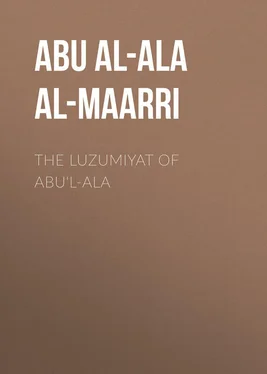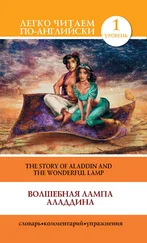Abu al-Ala al-Maarri - The Luzumiyat of Abu'l-Ala
Здесь есть возможность читать онлайн «Abu al-Ala al-Maarri - The Luzumiyat of Abu'l-Ala» — ознакомительный отрывок электронной книги совершенно бесплатно, а после прочтения отрывка купить полную версию. В некоторых случаях можно слушать аудио, скачать через торрент в формате fb2 и присутствует краткое содержание. Издательство: Иностранный паблик, Жанр: foreign_language, foreign_antique, foreign_prose, на английском языке. Описание произведения, (предисловие) а так же отзывы посетителей доступны на портале библиотеки ЛибКат.
- Название:The Luzumiyat of Abu'l-Ala
- Автор:
- Издательство:Иностранный паблик
- Жанр:
- Год:неизвестен
- ISBN:нет данных
- Рейтинг книги:5 / 5. Голосов: 1
-
Избранное:Добавить в избранное
- Отзывы:
-
Ваша оценка:
- 100
- 1
- 2
- 3
- 4
- 5
The Luzumiyat of Abu'l-Ala: краткое содержание, описание и аннотация
Предлагаем к чтению аннотацию, описание, краткое содержание или предисловие (зависит от того, что написал сам автор книги «The Luzumiyat of Abu'l-Ala»). Если вы не нашли необходимую информацию о книге — напишите в комментариях, мы постараемся отыскать её.
The Luzumiyat of Abu'l-Ala — читать онлайн ознакомительный отрывок
Ниже представлен текст книги, разбитый по страницам. Система сохранения места последней прочитанной страницы, позволяет с удобством читать онлайн бесплатно книгу «The Luzumiyat of Abu'l-Ala», без необходимости каждый раз заново искать на чём Вы остановились. Поставьте закладку, и сможете в любой момент перейти на страницу, на которой закончили чтение.
Интервал:
Закладка:
In 1010 A.D. he visited Baghdad, the centre of learning and intelligence and the capital of the Abbaside Khalifs, where he passed about two years and became acquainted with most of the literary men of the age. 7 7 For an interesting account of Literary Society in Baghdad see Renan’s “Islam and Science”; also the Biography to the Letters of Abu’l-Ala. Prof. Margoliouth, though not unfair in his judgment of the poet, is unnecessarily captious at times. He would seem partial to the suffrage of orthodox Mohammedans with regard to Abu’l-Ala’s unorthodox religious views. But they have a reason, these ulama, for endeavoring to keep a genius like Abu’l-Ala within the pale of belief. Which reason, let us hope, has no claim on Prof. Margoliouth. And in his attempt to depreciate Abu’l-Ala as a disinterested and independent scholar and poet, he does not escape the inconsistency which often follows in the wake of cavil. Read this, for instance: “Like many of those who have failed to secure material prosperity, he found comfort in a system which flatters the vanity of those who have not succeeded by teaching that success is not worth attaining.” And this, not on the same page perhaps, but close to it: “For though other roads towards obtaining the means of supporting himself at Baghdad have been open to him, that which he refused to follow (the profession of an encomiast, i. e. a sycophant, a toady) was the most certain.”
He attended the lectures and the readings of the leading doctors and grammarians, meeting with a civil reception at the hand of most of them.
He also journeyed to Tripoli, 8 8 Biography of Abu’l-Ala by Adh-Dhahabi.
which boasted, in those days, of many public libraries; and, stopping at Ladhekiyah, he lodged in a monastery where he met and befriended a very learned monk. They discussed theology and metaphysics, digressing now and then into the profane. Indeed, the skepticism which permeates Abu’l-Ala’s writings must have been nursed in that convent by both the monk and the poet.
These are virtually the only data extant showing the various sources of Abu’l-Ala’s learning; but to one endowed with a keen perception, a powerful intellect, a prodigious memory, together with strong innate literary predilections, they seem sufficient. He was especially noted for the extraordinary memory he possessed; and around this our Arab biographers and historians weave a thick net of anecdotes, or rather fables. I have no doubt that one with such a prodigious memory could retain in a few minutes what the average person could not; but when we are told that Abu’l-Ala once heard one of his pupils speaking with a friend in a foreign tongue, and repeated there and then the long conversation, word for word, without having the slightest idea of its meaning, we are disposed to be skeptical. Many such anecdotes are recorded and quoted by his Arab biographers without as much as intimating a single doubt. 9 9 “The Letters, which abound in quotations, enable us to gauge the power of his memory better than these wonder-loving narrators.” – D. S. Margoliouth.
The fact that he was blind partly explains the abnormal development of his memory.
His career as poet and scholar dates from the time he returned from Baghdad. This, so far as is known, was the last journey he made; and his home became henceforth his earthly prison. He calls himself “A double-fettered Captive,” 9 In one of his poems he speaks of three prisons, his body being the third. Here is Professor Nicholson’s translation: Methink I am thrice-imprisoned – ask not me Of news that need no telling — By loss of sight, confinement in my house, And this vile body for my spirit’s dwelling.
his solitude being the one and his blindness the other. Like most of the scholars of his age, in the absence of regular educational institutions, with perhaps one or two exceptions, he had to devote a part of his time to the large number of pupils that flocked to Ma’arrah from all parts of Asia Minor, Arabia, and India. Aside from this, he dictated to his numerous amanuenses on every possible and known subject. He is not only a poet of the first rank, but an essayist, a literary critic, and a mathematician as well. Everything he wrote was transcribed by many of his admirers, as was the fashion then, and thus circulated far and near. Nothing, however, was preserved but his Diwans, his Letters and the Epistle of Forgiveness, 10 10 Also his Commentary on the works of the poet Al-Mutanabbi.
of which I shall yet have occasion to speak. 11 11 Adh-Dhahabi gives the titles of forty-eight of his works, to which Safadi adds fourteen. A literary baggage of considerable bulk, had not most of it perished when the Crusaders took Ma’arrah in 1098. Now, the Luzumiyat, the Letters, Suct uz-Zand and the Epistle of Forgiveness can be obtained in printed form.
His reputation as poet and scholar had now, after his return from Baghdad, overleaped the horizons, as one writer has it. Honors were conferred upon him successively by the rulers and the scholars of his age. His many noted admirers were in constant communication with him. He was now looked upon as “the master of the learned, the chief of the wise, and the sole monarch of the bards of his century.” Ma’arrah 12 12 “What he says of Al-Maghribi in the First Letter became literally true of himself: ‘As Sinai derives its fame from Moses and the Stone from Abraham, so Ma’arrah is from this time (after his return from Baghdad) known by him.’” – D. S. Margoliouth.
became the Mecca of every literary aspirant; ambitious young scholars came there for enlightenment and inspiration. And Abu’l-Ala, although a pessimist, received them with his wonted kindness and courtesy. He imparted to them what he knew, and told them candidly what he would not teach, since, unlike other philosophers, he was not able to grasp the truth, nor compass the smallest of the mysteries of creation. In his latter days, youthful admirers sought his blessing, which he, as the childless father of all, graciously conferred, but with no self-assumed spiritual or temporal authority.
For thirty years he remained a vegetarian, living the life of an ascetic. 13 13 Even before he visited Baghdad he had a pension of thirty dinars (about $100), half of which he paid to his servant, and the other half was sufficient to secure for him the necessaries of life. “He lived on lentils and figs,” says Adh-Dhahabi; “he slept on a felt mattress; he wore nothing but cotton garments; and his dwelling was furnished with a straw matting.”
This mode of living led his enemies to accuse him of renouncing Islam and embracing Brahminism, one of the tenets of which forbids the slaughter of animals. The accusation was rather sustained by the dispassionate attitude he held towards it, and, furthermore, by his vehement denunciation of the barbarous practice of killing animals for food or for sport.
Most of the censors of Abu’l-Ala were either spurred to their task by bigotry or animated by jealousy and ignorance. They held him up to ridicule and opprobrium, and such epithets as heretic, atheist, renegade, etc., were freely applied. But he was supremely indifferent to them all, 14 14 We have the following from Adh-Dhahabi: “One of these critics came one day to Abu’l-Ala and relating the conversation himself said, ‘What is it that is quoted and said about you?’ I asked. ‘It is false; they are jealous of me,’ he replied. ‘And what have you to incite their jealousy? You have left for them both this world and the other.’ ‘And the other?’ murmured the poet, questioning, ruminating. ‘And the other, too?’”
and never would he cross swords with any particular individual; he attacked the false doctrines they were teaching, turning a deaf ear to the virulent vituperations they hurled upon him. I fail to find in the three volumes of his poems, even in the Letters, one acrimonious line savoring of personality.
Интервал:
Закладка:
Похожие книги на «The Luzumiyat of Abu'l-Ala»
Представляем Вашему вниманию похожие книги на «The Luzumiyat of Abu'l-Ala» списком для выбора. Мы отобрали схожую по названию и смыслу литературу в надежде предоставить читателям больше вариантов отыскать новые, интересные, ещё непрочитанные произведения.
Обсуждение, отзывы о книге «The Luzumiyat of Abu'l-Ala» и просто собственные мнения читателей. Оставьте ваши комментарии, напишите, что Вы думаете о произведении, его смысле или главных героях. Укажите что конкретно понравилось, а что нет, и почему Вы так считаете.












